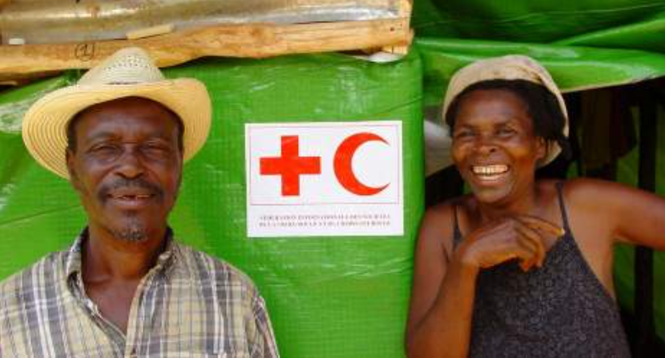
Summary
The IFRC’s IDRL Programme is changing its name to reflect its evolving focus, in response to the expressed interests of National Societies and its evaluation of humanitarian needs.
It will continue to provide substantial support on IDRL and the implementation of the IDRL Guidelines, including through advocacy, technical assistance, training and the development of tools.
It will also build its capacity, knowledge base and partnerships to allow it to respond more effectively to the demand for support on disaster law issues beyond the area of international disaster relief. In particular, it will actively follow up on the 31st International Conference’s requests regarding law and disaster risk reduction and overcoming regulatory barriers to post-disaster shelter.
Background
In 2001, at the request of the Red Cross and Red Crescent Council of Delegates, the IFRC launched the “International Disaster Response Law (IDRL) Project.” Its focus was on evaluating the existing international legal frameworks governing international disaster response. In 2003, the IFRC presented its first report on IDRL to the 28th International Conference of the Red Cross and Red Crescent. Participants endorsed the IFRC’s work but also encouraged it to broaden its focus somewhat to look to regulatory frameworks both at the international and national levels related to international disaster response. Accordingly, the name of the initiative was changed to the “International Disaster Response Laws, Rules and Principles Programme.”
Over the following years, the IDRL Programme continued to build its research base. It developed a comprehensive database of existing international instruments, conducted or convened over two dozen case studies examining the main problem areas in international relief operations, conducted a comprehensive survey of states and humanitarian organizations on their experiences and hosted a series of high-level regional forums. In response to the common problem areas identified in this research, the IFRC spearheaded negotiations to develop the “Guidelines for the domestic facilitation and regulation of international disaster relief and initial recovery assistance” (also known as the IDRL Guidelines), which were unanimously adopted at the 30th International Conference in 2007.
Since then, nine countries have adopted new laws or regulations consistent with the Guidelines and nearly two dozen have been involved with their National Societies, with support from the IFRC, in formal legal review processes. Several hundred National Society representatives, humanitarian partners and governmental officials have been trained on disaster law issues and IDRL issues have been given substantial prominence in many global and inter-governmental fora.
Why change the name?
In the course of its work supporting National Societies on the issue of IDRL, the IFRC has found that it is often difficult to separate regulatory issues related to international disaster relief from those related to the domestic response. Moreover, over a series of regional workshops held from 2008-11, National Society representatives have expressed their strong interest in addressing key humanitarian concerns related to disaster law beyond the area of international response, including issues related to disaster risk reduction and recovery. The IFRC has also received increasing requests from its members and key partners, such as UN OCHA and UNDP, to provide broader advice on disaster law issues.
In the run-up to the 31st International Conference in November 2011, the IFRC undertook targeted research on how legislation can best support effective disaster risk reduction at the community level and how regulatory barriers often impede the provision of emergency and transitional shelter after disasters. In its Resolution 7 on strengthening regulatory frameworks for disaster management, the International Conference called on states, with support from National Societies, the IFRC and other key partners, to review their laws in these areas. It also requested the IFRC to support National Societies and states “in the field of disaster law” generally, including with respect to the areas mentioned in the resolution.
What does the new name mean?
The name change does not mean that the IFRC is dropping its work on IDRL. On the contrary, in the short term at least, the Disaster Law Programme will still mainly concentrate on IDRL, particularly through country-level support of National Societies providing technical assistance to their governments. This is important to ensure that the momentum produced to date with the IDRL Guidelines is not lost. The Disaster Law Programme will continue to use (and promote) the term “IDRL” to refer to the law of international disaster response.
However, the Disaster Law Programme will also gradually build its capacity to support National Societies and governments on a wider range of legal issues. In particular, in collaboration with the Community Preparedness and Risk Reduction and Shelter Departments, the Humanitarian Diplomacy Division and other relevant IFRC colleagues at the Zone and field levels, it will actively follow up on the two new topics raised at the International Conference, namely legislation for disaster risk reduction at the community level and regulatory barriers to post-disaster shelter.
It will also expand its partnerships, both internally (within the Movement) and with external stakeholders, such as the United Nations, NGOs and academic institutions, to ensure that its new areas of work are complementary to other relevant initiatives and adding value to the efforts of National Societies.